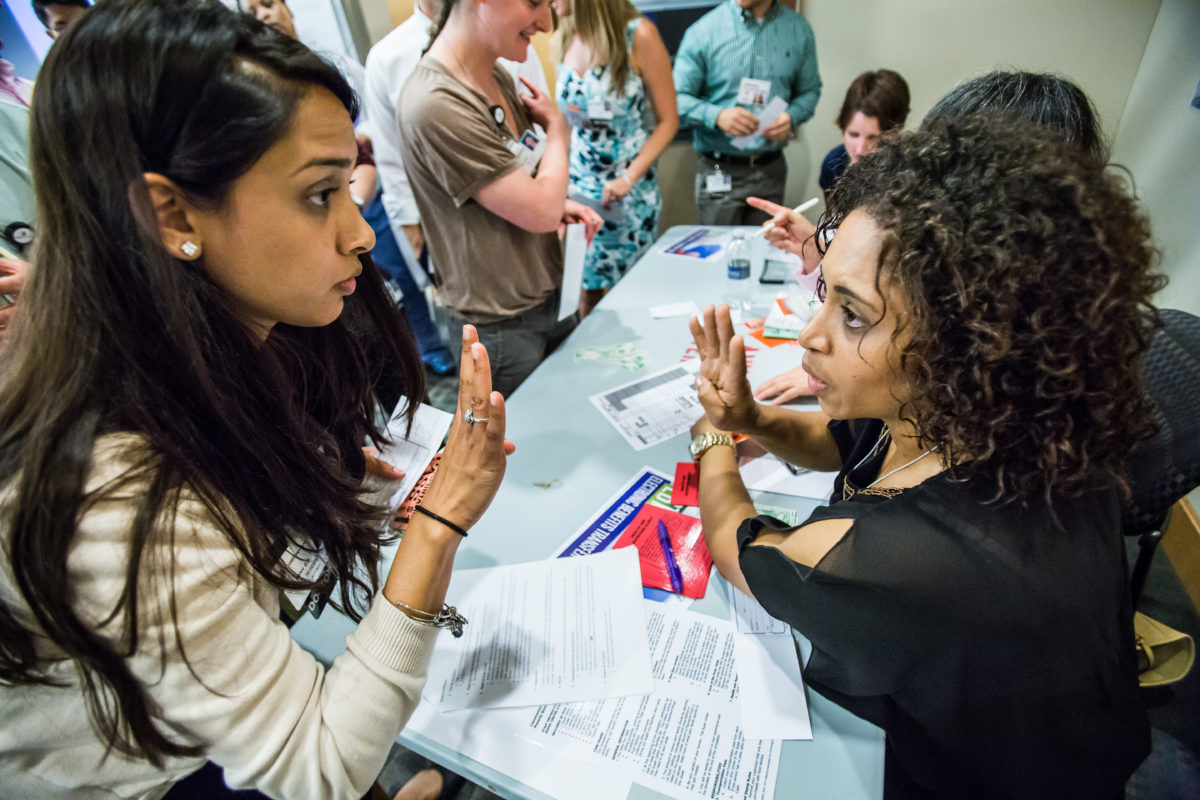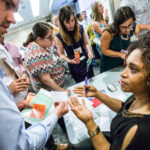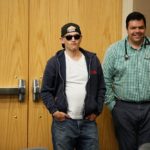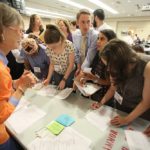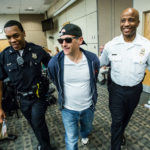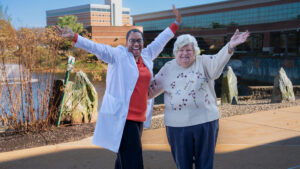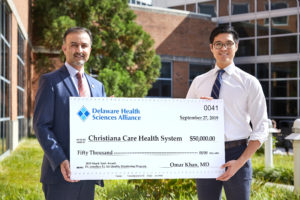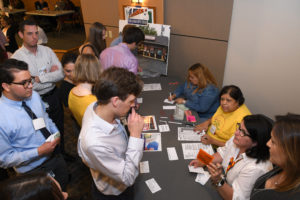As his family struggled to keep the electricity on, buy groceries and arrive at medical appointments on time, Jonathan Hilton, M.D., formed a new understanding for what low-income patients experience every day.
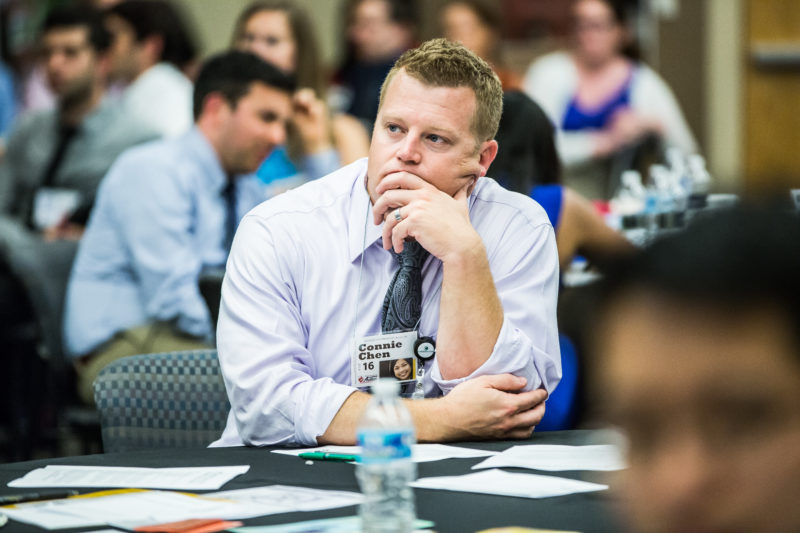
A first-year resident in emergency medicine, Dr. Hilton faced these obstacles while playing the role of a 16-year-old pregnant girl in a family of four. The challenge was part of Christiana Care’s Community Action Poverty Simulation, held June 23 at the John H. Ammon Medical Education Center. The simulation, which was an important element of the hospital’s orientation for 75 new first-year residents, is an educational immersion experience that sensitizes participants to what it is like to be poor.
“I can’t believe how frustrated I was, and this was only a simulation,” Dr. Hilton said.
Over three hours, residents were given a name and enrolled in one of 26 Wilmington families. They grappled with the need to seek food, shelter and other basic necessities during a month, when time and money were stretched to the breaking point. Vouchers, transportation passes, electronic transfer processes, benefits and eligibility combined to flabbergast many of the resident physicians in training at the Community Action Poverty Simulation.
In some cases, they were tempted to break the law to care for their families. In other cases, they didn’t know how to read or communicate in a grocery where only Spanish was spoken. Participants jumped hurdles to secure bus passes, cope with illness and find the money for medications. Often they would lose their jobs, find themselves broke or be sentenced to jail.
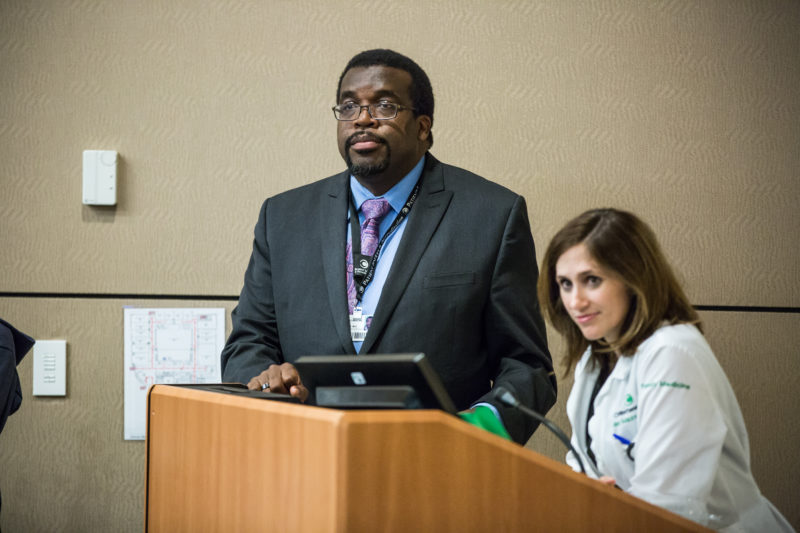
“Week by week we had to juggle priorities, and I definitely have greater empathy for people with very limited resources,” said Dr. Hilton, who shared how the experience made him feel with other residents and facilitators after the exercise ended.
LeRoi Hicks, M.D., MPH, vice chair, Department of Medicine, talked about different forms of health care disparity. Dr. Hicks is nationally known for his research in this field, has served on the national advisory council for the Society of General Internal Medicine and has been a grant reviewer with the National Institutes of Health.
The simulation, a first of its kind in Delaware, was a lively experience with representatives from more than a dozen community organizations volunteering to take part, adding another element of realism. Among the Wilmington-area organizations that sent representatives were an interfaith shelter, a pawn shop, a bank, a church, a grocery, social-service agencies and the Wilmington Police Department.
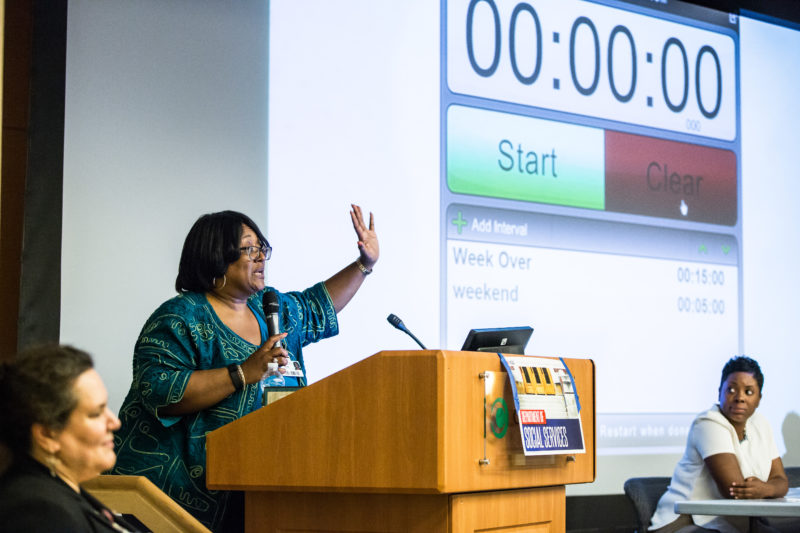
“Residents and volunteers from the community jumped into this wholeheartedly, which is one reason why it went so phenomenally,” said Dana Beckton, director, Diversity and Inclusion. Her office funded the purchase of the simulation kit from the Missouri Association for Community Action, and she co-facilitated the immersion experience with Jacqueline Ortiz, MPhil, director, Cultural Competence and Language Services.
“I think our medical residents and community members got a lot from this event,” said David Paul, M.D., chair of the Department of Pediatrics and physician leader of the Women & Children’s Service Line. “It’s also unique, in that we don’t know of other resident programs that have done this.”
Dr. Paul played the role of a “bad guy” in the simulation, adding chaos to stressful situations. He attempted to lead people astray and break the law to pay bills, and participants saw how easy it was to turn to a life of crime.
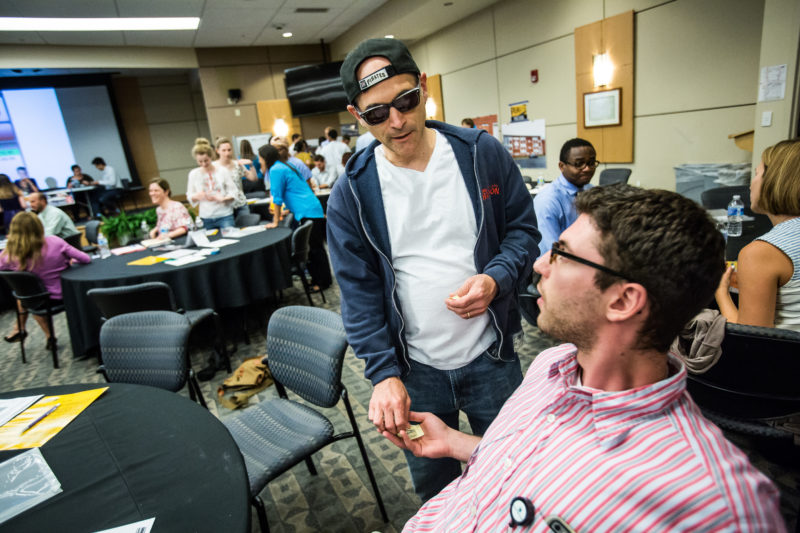
As a major teaching hospital, Christiana Care provides a clinical learning environment for more than 280 residents and fellows within 13 residency programs. The poverty simulation is Christiana Care’s early participation in a national effort of the Alliance of Independent Academic Medical Centers called “A-HA!” or “Advancing Health Advocacy through Resident Education.” It is a targeted initiative to raise awareness about disparities in health care.
“We have a whole curriculum we are developing for interns on health and income disparities,” said Dr. Paul. He is working on the curriculum with Renee Kottenhahn, M.D., FAAP, associate director, Pediatric Practice Program; Arlene J. Smalls, M.D., leader of the curriculum initiative; Michael Maguire, M.D., MPH, second-year resident, Internal Medicine/Pediatrics; Marisa Gilstrop, M.D., third-year resident, OB-GYN; Kristen Fritzges, second year Med-Peds resident; and Loretta Consiglio-Ward, MSN, RN, education specialist, Institute for Learning, Leadership & Development. They aim to help residents become competent and compassionate clinicians who understand vulnerable and marginalized populations and feel engaged in their local community.
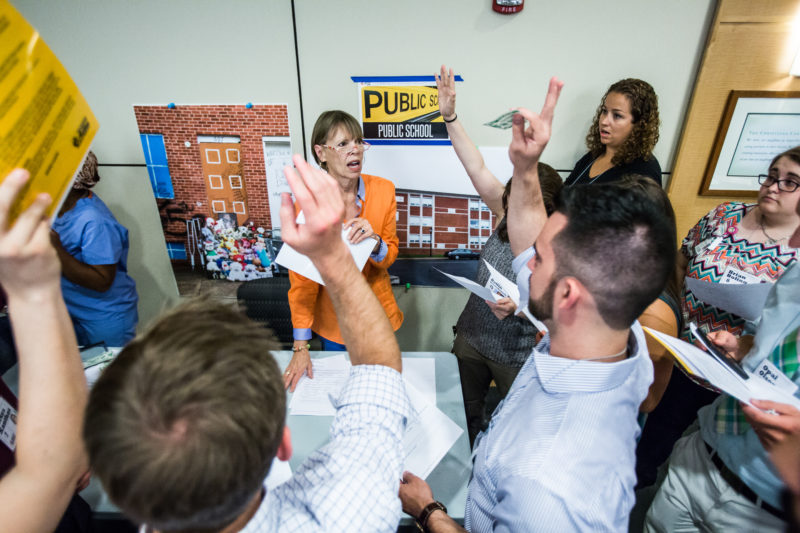
According to Dr. Smalls, the team selected the poverty simulation because of its interactive nature, because research suggests it can have a lasting impact and because it has received positive feedback in other states.
“At the end of the simulation, our interns felt it was a fun and valuable experience, giving them insight on why patients might have a difficult time making appointments and taking medication,” said Dr. Maguire. “They also appreciated the chance to connect with real community programs and businesses in Delaware.”
Graduate faculty and hospital administrators also observed the poverty simulation, and Christiana Care leaders are exploring ways it can be used across departments to extend awareness about disparities in health care. In addition, there are plans to use the poverty simulation with next year’s first-year residents.
To measure the effectiveness of the simulation, Consiglio-Ward is facilitating a study of attitudes toward poverty among first-year residents, both before and after the immersion experience.
“Improving our providers’ understanding of the challenges our neighbors face in being active participants in their health care is an important element for our population health strategy,” said Robert Dressler, M.D., MBA, quality and safety offcer, Academic and Medical Affairs. “With this knowledge, our providers can begin to address these social determinants of health one person at a time.”
Photo gallery: Poverty simulation
- Understanding the ins and outs of using benefits through electronic transfers was a major headache for some of the role-playing residents.
- Renee Kottenhahn, M.D., FAAP, associate director, Pediatric Practice Program, left, with Loretta Consiglio-Ward, MSN, RN, education specialist, Institute for Learning, Leadership & Development.
- David A. Paul, M.D., chair of Pediatrics, and Michael Maguire, M.D., MPH, second-year resident in the dual Internal Medicine/Pediatrics program, enjoy the drama.
- Striving to register children for school in time was a major challenge.
- Volunteers from Wilmington Police Department were happy to get this bad guy off the street.
